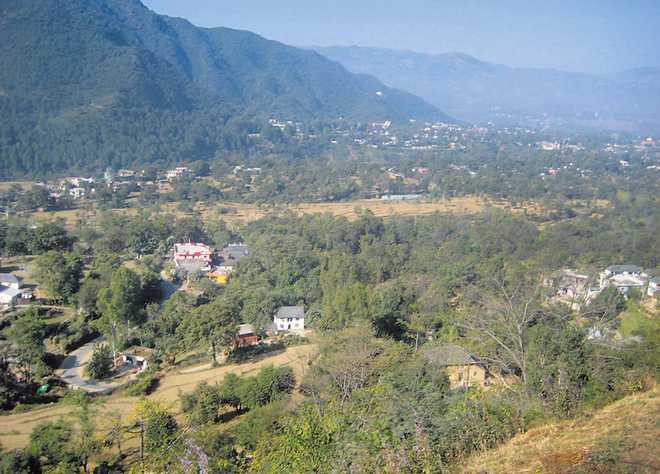
Forests ensure environmental stability. Photo: Mahesh Chander Sharma
SP Vasudeva
Retired Indian Forest Service Officer
VAN Mahotsav is a term wherein 'Van' means forests and 'Mahotsav' means festival. It is an annual tree planting and forest conservation event started in our country, in 1950, by then Union Agriculture and Food Minister KM Munshi.
The objectives visualised by him for celebrating this festival were to increase the production of fruits, adding to potential food resources of the country, creating shelterbelts around agricultural fields to increase their productivity, provide fodder leaves for cattle to relieve intensity of grazing over reserve forests, boost soil conservation to prevent further deterioration of soil fertility. This festival is usually celebrated every year in July after the onset of monsoons at national, state, district and grassroot levels.
The Forest Department in most cases supplies planting material free of cost. The occasion is used to create awareness among the masses wherein the need for tending and planting trees is highlighted for producing forests so that these generate employment, bring food security, energy generation, trigger economic growth and with that reduce pollution, prevent global warming and mitigate climate change.
Harsh Vardhan, Union Minister of Environment, Forests and Climate Change, elaborated on India's Intended Nationally Determined Contribution to create an additional carbon sink of 2.5-3 billion tons of carbon-dioxide equivalent by the creation of an additional forest and tree cover by 2030, as agreed to by the Government of India with the United Nations Framework Convention on Climate Change, the agency working with the objective to stabilise greenhouse gas concentrations at a level that would prevent dangerous anthropogenic interference with the climate system.
This target can be achieved through the conservation of forests, by increasing the density of degraded and open forests, raising plantations on wastelands and scrublands and afforestation outside forests through agro, farm and urban forestry.
Conservation has been defined by the World Conservation Strategy 1980 as the management of human use of natural resources in the biosphere so that they may yield the greatest sustainable benefits to the present generation while maintaining the potential to meet the needs and aspirations of future generations. Conservation of forests is considered essential as it helps in maintaining the potential of the other four natural resources — air, water, land and fauna, these being inter-connected, inter-related and inter-dependent.
Forests and trees contribute much more to human livelihoods than is commonly known. They play crucial roles in food security, water, renewal energy and rural economics. Therefore, conservation of fully grown forests in their pristine should get priority. Sustainable forest management helps in generating essential services in sustaining key sectors such as agriculture, horticulture, water resources, tourism, mining, energy through maintaining soil fertility, protecting watersheds, providing habitats to various species and reducing risks to disasters, especially floods and landslides.
The State of World Forest Report 2018 of FAO released recently speaks of halting deforestation, managing forests sustainably, restoring degraded forests and adding to the worldwide tree cover to avoid potentially damaging consequences for the planet and its people. This needs to be followed and implemented.
To achieve all this, there is an urgent need to conserve very dense and dense forests falling in the Protected Area Network (wildlife sanctuaries and national parks) and areas declared as reserve forests under the Indian Forest Act, 1927.
Plantation of indigenous species is required to improve the density of degraded and open forests by taking these towards dense and very dense categories.
Wastelands and scrub areas need to be treated on similar lines for bringing more area under the forest and tree cover.
Further plantation of trees on areas outside forests such as agricultural lands through agro and farm forestry and as urban forestry need to be taken up.
Funding is not a problem, with about Rs 39,000 crore in hand under CAMPA with the Ministry of Environment, Forests and Climate Change, and state forests departments. The essential need is to strategise and work on a missionary mode to achieve this task.
However, Van Mahotsav nowadays has become a ritual. This occasion is required to be celebrated by visualising as to how much area has been diverted for developmental purposes and how much has been encroached, degraded or destroyed.
There is need to initiate mass movement not only in planting of trees but also in controlling illicit felling, preventing and removing encroachments, educating people on the importance of forests and about the ill effects of their destruction and, with that, initiating soil and water conservation measures.
The area rehabilitated, planted and conserved needs to be assessed by the state forest departments as also the Ministry of Environment, Forests and Climate Change to visualise where we are moving in achieving the target set. The working of state forest departmentsis required to be re-strategised by bringing modernity and reforms.
Such an approach would help us in conserving the forests to the level these are required, achieving what Munshi had visualised and what is being propagated by the FAO and the UN to bring prosperity and well-being to the people of the country and ensuring environmental stability throughout the world.



























